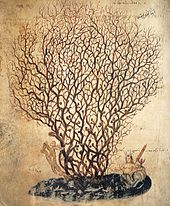Thalassa

Thalassa(/θəˈlæsə/;Greek:Θάλασσα,translit.Thálassa,lit."sea";[1]Attic Greek:Θάλαττα,Thálatta[2]) was the general word for 'sea' and for its divine female personification inGreek mythology.The word may have been ofPre-Greekorigin[3]and connected to the name of the Mesopotamian primordial sea goddessTiamat.[4]
Mythology
[edit]According to a scholion onApollonius of Rhodes,the fifth-century BC poetIon of Chioshad Thalassa as the mother ofAegaeon(Briareus, one of theHecatoncheires).[5]Diodorus Siculus(fl.1st century BC), in hisBibliotheca historica,states that "Thalatta" is the mother of theTelchinesand thesea-nymphHalia,[6]while in theOrphic Hymnto the Sea,Tethys,who is here equated with Thalassa,[7]is called the mother ofKypris(Aphrodite).[8]
The Roman mythographerHyginus(c. 64 BC – AD 17), in the preface to hisFabulae,calls Mare (Sea, another name for Thalassa)[9]the daughter ofAetherandDies(Day), and thus the sister ofTerra(Earth) andCaelus(Sky).[10]With her male counterpartPontus,she spawns the species of fish.[11]
Literature
[edit]
Two rather similar fables are recorded byBabrius.In one, numbered 168 in thePerry Index,a farmer witnesses a shipwreck and reproaches the sea for being "an enemy of mankind". Assuming the form of a woman, she answers by blaming the winds for her turbulence. Otherwise, "I am gentler than that dry land of yours."[12]In the other, a survivor from a shipwreck accuses the sea of treachery and receives the same excuse. But for the winds, "by nature I am as calm and safe as the land."[13]
In yet another fable, Perry's number 412 and only recorded bySyntipas,the rivers complain to the sea that their sweet water is turned undrinkably salty by contact with her. The sea replies that if they know as much, they should avoid such contact. The commentary suggests that the tale may be applied to people who criticize someone inappropriately even though they may actually be helping them.[14]
In the 2nd century CE, Lucian represented Thalassa in a comic dialogue with Xanthus, the god of the RiverScamander,who had been attacked by a rival Greek deity for complaining that his course was being choked with dead bodies during theTrojan War.In this case he had been badly scorched and asks her to soothe his wounds.[15]
Art
[edit]
While the sea-divinities Tethys and Oceanus were formerly represented in Roman-era mosaics, they were replaced at a later period by the figure of Thalassa, especially inWestern Asia.There she was depicted as a woman clothed in bands of seaweed and half submerged in the sea, with the crab-claw horns that were formerly an attribute of Oceanus now transferred to her head. In one hand she holds a ship's oar, and in the other a dolphin.[16]
In 2011,Swooncreated asite-specificinstallationdepicting the goddess in the atrium of theNew Orleans Museum of Art.[17]In fall 2016, the installation was erected once more in the atrium of theDetroit Institute of Arts.
Notes
[edit]- ^Beekes,s.v. Θάλασσα, p. 530.
- ^Silva,pp. 71 ff.;Beekes,s.v. Θάλασσα, p. 530.
- ^Beekes,s.v. Θάλασσα, p. 530.
- ^Jacobsen, Thorkild (1968)."The Battle between Marduk and Tiamat".Journal of the American Oriental Society.88(1): 104–108.doi:10.2307/597902.ISSN0003-0279.
- ^Ion of Chios,fr. 741 Campbell[= fr. 741PMG= Scholia onApollonius of Rhodes,1.1165c (Wendel,p. 106)];BNJ,commentary on 3 F43,commentary on 424 F5.
- ^Diodorus Siculus,5.55.1,5.55.4.
- ^Morand, p. 338, table 2; Athanassakis and Wolkow,p. 114.
- ^Morand, p. 332, table 1;Orphic Hymnto the Sea(22), 7 (Athanassakis and Wolkow,p. 22).
- ^Oxford Classical Dictionary,s.v. Pontus, p. 1220.
- ^Hyginus,FabulaeTheogony 2 (Smith and Trzaskoma,p. 95;Latin text).
- ^Hyginus,FabulaeTheogony 5 (Smith and Trzaskoma,p. 95;Latin text).
- ^Babrius II.22
- ^Babrius I.71
- ^Aesopica
- ^Lucian,Confabulations of the Marine DeitiesXI (pp. 355–356).
- ^Eraslan,pp. 5–7.
- ^"Swoon: Thalassa (The Great Hall Project)".Retrieved2013-04-16.
References
[edit]- Athanassakis, Apostolos N.,and Benjamin M. Wolkow,The Orphic Hymns,Johns Hopkins University Press, 2013.ISBN978-1-4214-0882-8.
- Babrius,Phaedrus,Fables.Translated by Ben Edwin Perry.Loeb Classical LibraryNo. 436. Cambridge, Massachusetts, Harvard University Press, 1965.Online version at Harvard University Press.
- Beekes, Robert S. P.,Etymological Dictionary of Greek,2 vols, Leiden,Brill,2009.ISBN978-90-04-17418-4.Online version at Brill.
- Campbell, David A.,Greek Lyric, Volume IV: Bacchylides, Corinna,Loeb Classical LibraryNo. 461. Cambridge, Massachusetts,Harvard University Press,1992.ISBN978-0-674-99508-6.Online version at Harvard University Press.
- Diodorus Siculus,Library of History,Volume III: Books 4.59-8,translated byC. H. Oldfather,Loeb Classical LibraryNo. 340, Cambridge, Massachusetts,Harvard University Press,1939.ISBN978-0-674-99375-4.Online version at Harvard University Press.Online version by Bill Thayer.
- Eraslan, Şehnaz, "Tethys and Thalassa in mosaic art", inArt Sanat,Vol. 4, pp. 1–13.PDF.
- Hyginus, Gaius Julius,FabulaeinApollodorus'Libraryand Hyginus'Fabulae:Two Handbooks of Greek Mythology, translated, with Introductions by R. Scott Smith and Stephen M. Trzaskoma,Hackett Publishing, 2007.ISBN978-0-87220-821-6.Google Books.
- Hyginus, Gaius Julius,Hygini Fabulae,edited byHerbert Jennings Rose,Leiden, Sijthoff, 1934.Online version at Packhum.
- Lucian,Lucian of Samosata, from the Greek, with the Comments and Illustrations of Wieland and others,Volume I, translated byWilliam Tooke,London, 1820.Google Books.
- Morand, Anne-France,Études sur les Hymnes Orphiques,Brill,2001.ISBN978-900-4-12030-3.Online version at Brill.
- Oxford Classical Dictionary,revised 3rd ed., Simon Hornblower and Antony Spawforth (editors),Oxford University Press,2003.ISBN0-19-860641-9.Internet Archive.
- Silva, Moises,God, Language and Scripture: Reading the Bible in the light of general linguistics,Zondervan, 1990.ISBN978-0-310-87743-1.
- Wendel, Carl,Scholia in Apollonium Rhodium vetera,Hildesheim, Weidmann, 1999.ISBN978-3-615-15400-9.
External links
[edit] Media related toThalassa (mythology)at Wikimedia Commons
Media related toThalassa (mythology)at Wikimedia Commons
